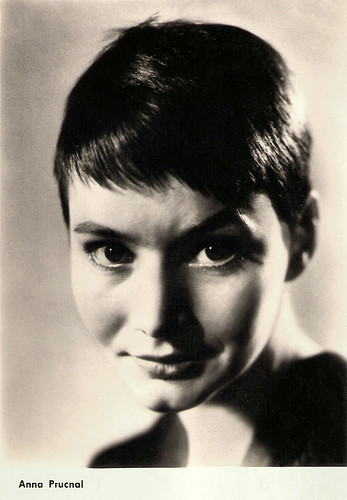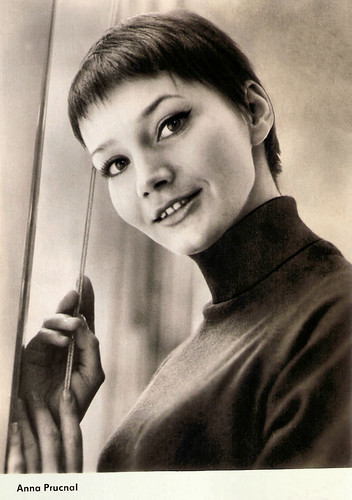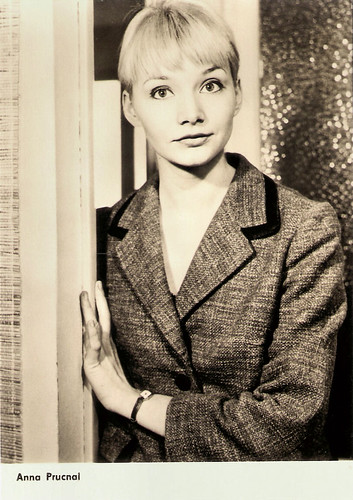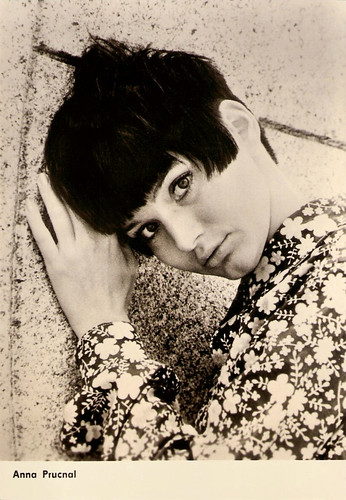East-German postcard by VEB Progress Film-Vertrieb, Berlin, no. 2259, 1965. Retail price: 0,15 MDN. Photo: Schwarz.
Centre of Intellectual Challenge
Anna Prucnal was born in Warsaw, Poland, in 1940.
Her father, a surgeon of Jewish-gypsy origin, was killed by the Nazis during the Second World War. Anna was then raised, along with her sister, solely by her mother. Her mother was related to Stanislas Leszczyński: an 18th century King of Poland.
After studying piano and lyrical song, Anna went on to pursue an acting career in Warsaw. She started acting at the student theatre group STS, a centre of intellectual challenge in Warsaw.
Her first film appearance was in the Bulgarian film Slăntzeto i siankata/Sun and Shadow (Rangel Vulchanov, 1962), which made her immediately popular all over Eastern-Europe.
Next she played in various East-European productions. In the Polish Smarkula/Teenager (Leonard Buczkowski, 1963) she appeared as a teenage girl, lost in Warsaw.
In East-Germany she appeared opposite Fred Düren in the DEFA production Der fliegende Holländer/The Flying Dutchman (Joachim Herz, 1964). Another DEFA production was the comedy Reise ins Ehebett/Journey into the Nuptial Bed (Joachim Hasler, 1966) with Eva-Maria Hagen.
In Poland she worked with the famous director Andrzej Wajda on the short TV film Przekladaniec/Layer Cake (Andrzej Wajda, 1968), the story of a racing car driver who undergoes so many transplants that it can no longer be determined which people have contributed to his make-up.

East-German postcard by VEB Progress Film-Vertrieb, Berlin, no. 2.039, 1964. Retail price: 0,20 MDN. Photo: Karin Blasig.

East-German postcard by VEB Progress Film-Vertrieb, Berlin, no. 2512, 1965. Retail price: 0,20 MDN. Photo: Balinski.
Notorious
Anna Prucnal moved to France in 1970 and embarked upon a theatrical career, appearing in a number of plays by Bertolt Brecht. She worked with many important stage directors including: Georges Wilson, Roger Planchon, and Jean-Louis Barrault.
During this time she also appeared in several films, including Hellé (Roger Vadim, 1972) and the TV film Un jeune homme seul (Jean Mailland, 1974).
Notorious was Sweet Movie (Dusan Makavejev, 1974) in which she co-starred with Carole Laure and Pierre Clementi. Nathan Southern at AllMovie explains: “Like his WR: Mysteries of the Organism, Dusan Makavejev's controversial 1974 feature Sweet Movie is firmly rooted in the principles of psychoanalyst Wilhelm Reich. In cinematic terms, this means bombarding the audience with an onset of imagery so visceral, disgusting and repellent that it ‘awakens’ the viewer in a Brechtian manner by ‘short-circuiting’ the audience's reactions.”
At IMDb, Yngvar Myrvold writes: “It brings to memory the golden days of the early 70's, when radical sex and politics thrived in the cinemas along with traditional Hollywood-fare, and movies were still considered dangerous and subversive. The movie itself is funny, tasteless, allegorical and even has glorious in-jokes. Like the river-boat Potemkin sailing down the Seine with the enormous head of Lenin in the prow.”
At the time Polish authorities were not amused and deemed the film to be pornographic and anti-communist. As a result, Prucnal was banned from using her Polish passport by the repressive authorities of the time – effectively exiling her from her homeland.

East-German postcard by VEB Progress Film-Vertrieb, Berlin, no. 2875, 1967. Retail price: 0,20 MDN. Photo: Balinski.

East-German postcard by VEB Progress Film-Vertrieb, Berlin, no. 3001, 1967. Retail price: 0,20 MDN. Photo: Balinski.
Fellini
In 1978 Anna Prucnal started a new career as a singer. Her album Rêve d'Ouest-Rêve d'Est (Dream of West, Dream of East) proved to be popular. Initially she performed it during recitals in Paris, later in Belgium and then worldwide. After 15 years, she returned to Warsaw for a recital to celebrate the bicentenary of the French revolution in 1989.
Since then Anna Prucnal has continued to release records such as Monsieur Brecht in 2006. She also appeared in films as the crime drama Le dossier 51/Dossier 51 (Michel Deville, 1978) and in Mais où et donc Ornicar/Glass Cages (Bertrand Van Effenterre, 1979) with Geraldine Chaplin. The French film title is a sentence learnt in school to remember the conjunctions in French grammar: mais, ou, et, donc, or, ni, car (mais où et donc ornicar?).
In Fellini’s wonderful La città delle donne/City of Women (Federico Fellini, 1980), she played Marcello Mastroianni’s former wife.
Prucnal also regularly appeared on French TV such as in the series V comme vengeance/V for Vengeance (1989-1992).
During the 1990s she played again in Polish films such as Obywatel swiata (Roland Rowinski, 1991), Lepiej byc piekna i bogata/Better to Be Pretty and Rich (Filip Bajon, 1993) with Daniel Olbrychski, and Wrony/The Crows (Dorota Kedzierzawska, 1994) about a young girl who mimics a crow.
Her most recent film is the French Le stade de Wimbledon/Wimbledon Stage (Mathieu Amalric, 2001).
On stage she appeared in La Voix humaine (The Human Voice) by Jean Cocteau and Francis Poulenc, under the direction of her life partner Jean Mailland in 1993, and in the acclaimed play The Vagina Monologues by Eve Ensler in 2005.
In 2002, Anna Prucnal published her autobiography entitled Moi qui suis née à Varsovie (I, who was born in Warsaw). She and Jean Mailland have a son, Pierre.
The boat entrance scene in Sweet Movie (1974) with Anna Prucnal and Pierre Clementi. Source: rqwxyz (YouTube).
Anna Prucnal sings Quand on n'a que l'amour by Jacques Brel and Élisabeth by Jean Mailland and Francis Lai. Source: Nina fan 1968 (YouTube).
Sources: Nathan Southern (AllMovie), Yngvar Myrvold (IMDb), Wikipedia and IMDb.
No comments:
Post a Comment